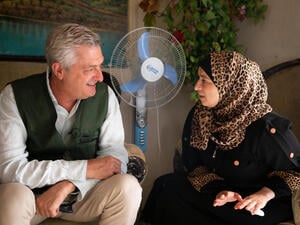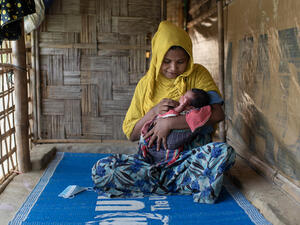UNHCR: reconciling the gap between budget and income
UNHCR: reconciling the gap between budget and income
We've had calls the past few days asking about UNHCR's ongoing efforts to reconcile the considerable gap between our budget and our actual income - a problem we've experienced for the past two years (2000-2001). This year, for example, we have an approved budget of $954.7 million, but a projected income of around $810 million. Mr. Lubbers has stated repeatedly since assuming office in January that this disparity cannot continue. If donors cannot provide funding for a budget that 57 governments approve in advance each year in our annual Executive Committee meeting, then UNHCR is left with no choice but to make reductions using a system of clearly established priorities. Like anyone, UNHCR has to set a realistic budget and live within its means.
That doesn't mean we can't also strive to broaden our donor base to ensure an adequate income in the longer term, but in the short term the gap between this year's approved budget and our projected income requires immediate attention.
So, beginning in February, an extensive global review and priority-setting exercise has been undertaken at the initiative of the High Commissioner. Mr. Lubbers called for this review to be done in a systematic way, with three specific actions:
- First, defining UNHCR's essential, core activities;
- Secondly, applying that definition to our activities worldwide to identify possible cost savings that can begin in 2001 and be fully realised in 2002.
- And thirdly, to take a longer-term, overall look at our fundraising approach with a view to ensuring that we receive adequate support through a broader, more stable and assured funding base.
A review of our work in 120 countries as well as at headquarters has been done and findings on possible savings submitted to the High Commissioner. Mr. Lubbers and other senior management are now examining the results, so I do not yet have specific numbers on what may be affected and where. But there will be post cuts and some staff will be affected. At the same time, some operations will be strengthened.
No matter how necessary and urgent, this is an extremely painful thing to do. It will affect refugees and it will cause anguish for dedicated staff members who are already making enormous sacrifices. Our 5,100 colleagues are currently working in 279 locations around the world. They represent 149 nationalities and they work in some of the most difficult and dangerous places on earth. More than 80 percent of them are in the field, and 60 percent of them live and work in non-family duty stations.
The High Commissioner has pledged to make this difficult process open and transparent, and to be as supportive as possible to affected staff members. UNHCR's Human Resources Service is currently developing an approach that would allow staff reductions to be implemented with as little hardship as possible.








